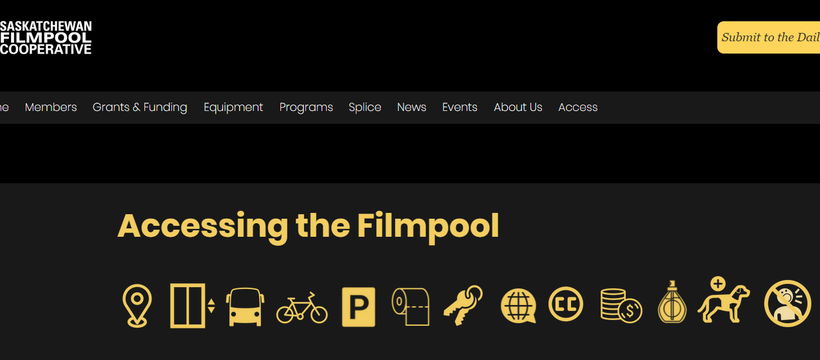
Saskatchewan Film Cooperative Prioritizes Accessibility for Members
Making sure all community members' needs are considered, including those in the disability community, is a major focus for the Saskatchewan Filmpool.
In 2021, Hagere Selam “shimby” Zegeye-Gebrehiwot, the Filmpool’s new executive director, made changes to repurpose the organization’s former membership and communications job, into a Membership Innovation Coordinator, in order to focus on how the organization could better reflect and support the community it serves.
Embracing the concept of “innovation” was necessary to move forward, says Zegeye-Gebrehiwot, “As there needs to be a regular check in, or updates on what we're trying out and what we're experimenting with, as well as, what we're learning from to figure out how to keep on modernizing the organization to bring ourselves forward while not leaving behind some of the stuff that works well.”
One of the tasks to address change needed was creating a dedicated “access page” on the Filmpool’s website that is aimed at providing patrons and members with information that helps increase accessibility. Some new accessibility information on the website includes: the size of the elevator to make sure wheelchair users can enter safely; a statement that highlights the mutual responsibility of creating a safe space; and an accessibility widget that allows viewers to change things such as the contrast levels and text size. The organization also acknowledges the organizations they consulted with, including, Listen to Dis’, a Regina-based disability arts organization and Khyber Centre for the Arts from Halifax, NS.
“Having a dedicated part of our website where anybody who is trying to learn more about the organization, or who might be new to it, could get a sense of some of the things that physically, structurally [they might have to navigate] that are a part of where we're located was important,” says Zegeye-Gebrehiwot. They goes on to explain that other points of access are necessary to consider, such as language, transportation, or financial access. “That’s why there's just a bit of a hub on our website for people to be able to get a sense of what the organization offers more broadly and holistically, and the framework for how we offer things within.”
They added, that whenever questions of equity and access are brought forward, others at the Filmpool–whether they be staff or board members–are supportive and operating with “curiosity and excitement”.
“I think that we're here to be good neighbors, but in ways that are thoughtful and not extractive,” they say. “And we also have work to do. I think that the access page is just one step of many that needs to happen.”
Zegeye-Gebrehiwot’s advice to organizations that are contemplating how they can best support their communities in this way, is to sit with the fact that change, whether it’s sorely needed or rthe natural order ofthings, is one of the few constants in non-profit leadership.
“The nature of our organization, and of our sector as well, is that every few years, there will be staff turnover for permanent positions. That also means that we have to properly equip our team with the tools for unpacking and understanding why it is we do what we do, and the ways we want to do it.”
“We still have a long way to go, but that's also why we're here, so that we can continue to grow and move forward.”


 Engage - Volume 13, Issue 1, Fall 2022
Engage - Volume 13, Issue 1, Fall 2022